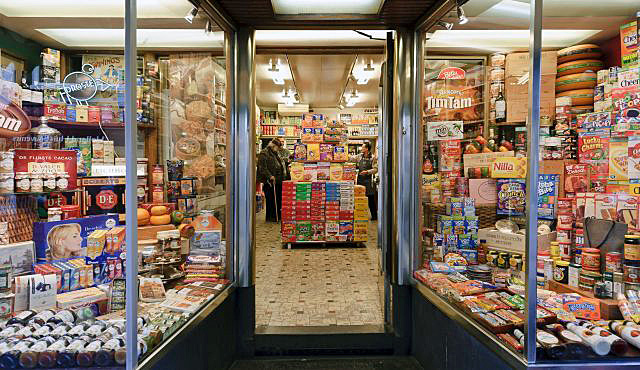PBS: Escaping Eritrea … [Read More...] about ካብ ውሽጢ ቤት ማእሰርታት ኤርትራ
European FMs urge policy chief: Label West Bank settlement products
By Barak Ravid, 16 April 2015, Haaretz (Israel)
Sixteen out of 28 foreign ministers – including France and Britain – sign letter saying that Europeans must not be ‘misled by false information,’ and must be aware if the origin of goods is from over the Green Line.
The foreign ministers from 16 out of 28 European Union countries on Thursday sent a letter to EU foreign policy chief Federica Mogherini asking her to push forward the process of labeling goods produced in Israeli settlements that are sold in grocery chains across the continent.
The letter obtained by Haaretz (included below) is signed by the foreign ministers of France, Britain, Spain, Italy, Belgium, Sweden, Malta, Austria, Ireland, Portugal, Slovenia, Hungary, Finland, Denmark, The Netherlands and Luxembourg. Germany is the only one of the five big European states not to sign on to the letter.
“We would like to draw your attention to the letter dated 13th April 2013 sent to your predecessor on EU-wide guidelines on the labeling of settlement produce/products,” reads the letter obtained by Haaretz. “…We remain of the view that this is an important step in the full implementation of EU longstanding policy, in relation to the preservation of the two-state solution.”

“[The] continued expansion of Israeli illegal settlements in the Occupied Palestinian Territory, and other territories occupied by Israel since 1967, threatens the prospect of a just and final peace agreement,” the letter reads.
The ministers argue that such labeling of settlement goods is necessary to prevent consumers from bring “misled by false information.”
“European consumers must indeed have confidence in knowing the origin of goods they are purchasing,” the ministers write. “Green Line Israel and Palestinian producers will benefit from this.”
The effort to advance EU guidelines for labeling settlement products across the continent began several years ago. In April 2103, the foreign ministers of 13 EU countries sent a similar letter to Mogherini’s predecessor, Catherine Ashton. She began pushing the initiative forward, but put it on hold in the summer of 2013 at the request of U.S. Secretary of State John Kerry who was trying to restart Israeli-Palestinian peace talks.
Since the breakdown of talks between Israelis and Palestinians in March 2014 and the diplomatic stalemate that followed, additional countries have joined the effort to label settlement goods. In recent months, the European countries avoided pressing ahead with the measure so as not to appear to be interfering in Israeli elections.
European diplomats pointed out that now, after the election, and in light of Prime Minister Benjamin Netanyahu’s remarks opposing a two-state solution, they decided to renew their effort. “We would welcome you taking the lead in the Commission, in order to complete this important work on labeling of settlement produce/products,” the letter states. “We remain of course ready to assist you in doing so.”
Senior officials in the Foreign Ministry and senior European diplomats said that the current letter was worded by Belgian Foreign Minister Didier Reynders. German Foreign Minister Frank Walter Steinmeier was the only one of the five major European foreign ministers not to sign the letter. Germany has dissented from the initiative to mark settlement products in the European market, in great part due to its historic and symbolic relationship with Israel. Germany’s ability to prevent a decision on the matter is limited, but it has clarified that it opposes the step and will be the last country in Europe to implement such a process.
In August 2014, Belgium published guidelines requiring chain stores to label agricultural products from West Bank settlements, East Jerusalem and the Golan Heights. According to the guidelines, all fresh fruit and vegetables, olive oil, fish, honey, red meat, poultry, eggs, organic products and cosmetics produced in those areas must be labeled.
Since taking office several months ago, EU foreign policy chief Mogherini has made it clear that she intends to put Israeli-Palestinian peace talks high on her agenda. Mogherini, who is considered friendlier toward Israel than Ashton, had planned a new diplomatic push immediately following the Israeli election, appointed a special envoy to represent her on the issue and even hoped to develop a trusting work relationship with Netanyahu.
At the same time, many EU countries blame Israel for the diplomatic deadlock, especially considering continued settlement construction, and want to increase the pressure on Jerusalem by asking Mogherini to take steps such as settlement product labeling.
European and Israeli diplomats said that in private discussions between EU states that took place before the Israeli election, many of the countries representatives said that if Netanyahu was reelected and forms a right-wing government, they will have no choice but to impose sanctions on settlement products and take other steps to prevent Israel from crossing “red lines” that would make a two-state solution impossible.
The actions considered “red lines” by the Europeans are building in the E1 area between the settlement of Ma’aleh Adumim and Jerusalem, construction in the Givat Hamatos and Har Homa neighborhoods of Jerusalem, both of which are beyond the Green Line. The EU believes Israeli construction in those areas would jeopardize the possibility of creating a contiguous Palestinian state and would not enable Jerusalem to serve as the capital of both states.
In November 2014, Haaretz published an expose of an internal working paper formulated by the 28 EU member states in Brussels that included a list of possible sanctions to level against Israel in the event it crosses those “red lines.” The document, which serves as an outline for discussion by the 28 foreign ministers of EU members, includes taking measures against European companies that operate in the settlements, refusing to meet or speak with Israeli public figures who represent the settlements or those who publicly reject the two-state solution, recalling ambassadors from Israel and more.
